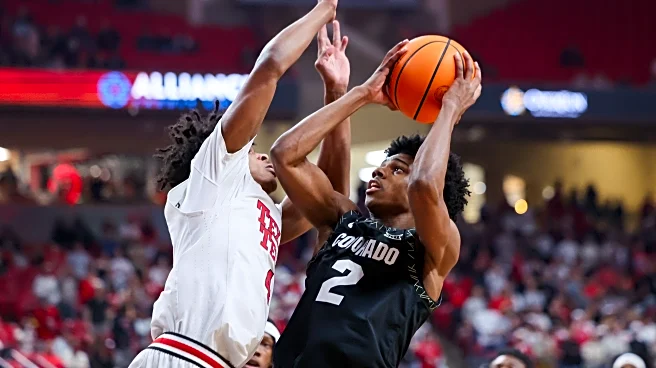What's Happening?
Deion Sanders, head coach of the Colorado football team, is navigating a challenging season marked by a tough schedule and disparities in NIL resources. According to NCAA statistics, Colorado has faced the nation's most difficult schedule through five games, with opponents holding a combined record of 15-1. Despite a 2-3 record, Sanders remains optimistic, noting that two losses were against ranked teams by a total of only 10 points. Sanders has dismissed the notion that NIL resource disparities are to blame for the team's close losses, emphasizing the competitive nature of his team. The team is set to face TCU next, where Sanders began his tenure at Colorado with a notable win in 2023.
Why It's Important?
The challenges faced by Deion Sanders and the Colorado football team highlight broader issues in college sports, such as the impact of NIL resources on team performance. While some schools have significant funding for athlete compensation, Colorado has streamlined its fundraising efforts, potentially affecting its competitiveness. This situation underscores the growing importance of financial resources in college athletics, which can influence recruitment and overall team success. Sanders' approach to overcoming these challenges reflects a focus on player development and strategic gameplay, which could serve as a model for other programs facing similar disparities.
What's Next?
Colorado's football team will continue to face a demanding schedule, with upcoming games against TCU and No. 12 Iowa State. Sanders plans to stick with Liberty transfer Kaidon Salter as the starting quarterback, aiming to build consistency in the team's performance. The team is also adapting to injuries, with sophomore receiver Dre'Lon Miller taking on a versatile role. Sanders' emphasis on playing with intensity and passion will be crucial as the team seeks to improve its record and compete against top-ranked opponents. The outcome of these games could influence Colorado's standing and future strategies in college football.
Beyond the Headlines
The situation at Colorado raises questions about the ethical and cultural dimensions of NIL agreements in college sports. As schools navigate the complexities of athlete compensation, the balance between financial incentives and athletic integrity becomes increasingly significant. Sanders' rejection of blaming financial disparities for losses suggests a focus on fostering a resilient team culture, which may influence long-term shifts in how college programs approach NIL challenges. This development could lead to broader discussions on the role of money in sports and the importance of maintaining competitive fairness.











